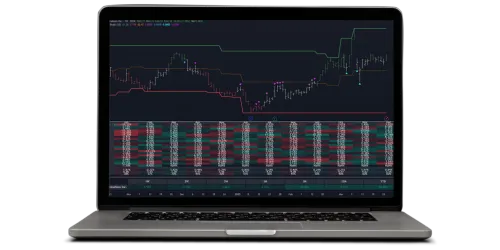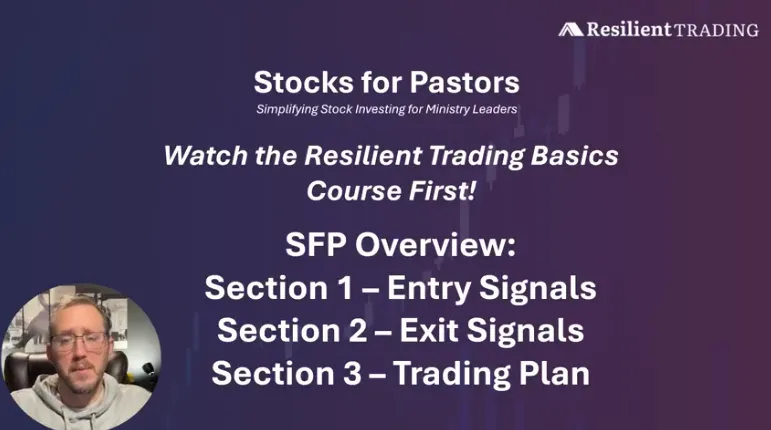A step-by-step seasonal investing system designed for busy pastors.
Grow your retirement at 3x the speed of mutual funds, without giving up your calling.

Let’s Talk About the Quiet Financial Pressure Most Pastors Carry
You’re not lazy. You’re not irresponsible.
You’ve just been so focused on helping others that your own financial future got pushed to the side. Maybe…
You’ve contributed to a retirement account here and there, but it’s nowhere near enough.
You’ve looked at the stock market before and thought, “I don’t have time to figure this out.”
You’ve wondered if you’ll have to keep working long after you want to stop, just to make ends meet.
You’ve even considered a second job or side hustle... but the thought of it wears you out.
You're not alone.
Thousands of pastors are in the same boat and they're quietly anxious about what the future holds.
But here's the truth:
You don’t need to work harder. You just need a smarter way to grow what you already have.
It’s a simple, proven investing system designed specifically for pastors who want to build wealth for the long haul; without financial stress, guesswork, or complicated strategies

You don’t need a finance degree. You don’t need thousands of dollars.
All you need is a desire to take control of your future, and a guide who understands your world.
What You’ll Gain
Follow a clear strategy based on predictable seasonal patterns
Receive a monthly watchlist of 20 high-probability stock opportunities
Grow your retirement savings steadily at 2–3% per month
Invest with confidence, even if you're just starting
Take action in under 15 minutes a week
Why Pastors Trust This Plan
You deserve a plan that works, and we’ve got the numbers to prove it.
74% win rate on seasonal trades
2–3% monthly ROI goal—compounding to 26–43% annually
90% of months have been profitable
100+ pastors served through our investing community
Start with as little as $100

Whether you're managing a tight budget or just want a smarter long-term strategy, the Growth Plan gives you the tools and the confidence to build wealth with purpose.
PRICING
Choose Your Plan
Monthly
$15/mo
Beginner-friendly video course that walks you through every step
Monthly Stock Watchlist with 20 seasonally strong picks
Step-by-step trade setup guide
Access to our investor community
Ongoing support & updates
Get 2 months free with Yearly Plan
Credit toward Income Plan Upgrade

No contracts - cancel anytime
Annually (Best VALUE)
$147/yr
Beginner-friendly video course that walks you through every step
Monthly Stock Watchlist with 20 seasonally strong picks
Step-by-step trade setup guide
Access to our investor community
Ongoing support & updates
Get 2 months free with Yearly Plan
Credit toward Income Plan Upgrade

No contracts - cancel anytime
What Members are saying

“I never thought investing was something I could do—but this gave me confidence, clarity, and a clear path forward.”
Jason D.

“My account has nearly doubled in 18 months since I started with Stocks for Pastors.”
Eric B.

“Michael’s course has helped me see a clear path to advance my family financially. It is doable and attainable- exactly like he said it would be."
Dave C.
Ready to Start?
Take the first step toward financial freedom.
On your time, with your values, and for your future.
Read Our Latest Blogs
Lorem ipsum dolor sit amet, consectetur adipiscing elit.

Poor, Poor Pastors
There is a statistic from a recent study that should alarm us as pastors. Nearly a third of us have $0 in personal savings. That means 1 out of every 3 colleagues in your vocation wake up each morning without a dollar to his or her name. Equally as alarming is the fact that 84% of pastors in America do not have an emergency fund to cover any big expenses.
Some may look at these numbers and nod with approval believing that ministry workers are called to a life of scarcity. As the head of a deacon board once prayed for his pastor, “Lord, we’ll keep him poor; You keep him humble.” But Scripture never insists on God’s people being poor. In fact, the passages like Proverbs make an undeniable comparison linking poverty with foolishness (and wealth with wisdom).
Shame on churches who intentionally keep their pastor poor. Paul says in 1 Tim 5 that those who preach and teach God’s Word are worthy of wages. Yet the bigger shame is why so many pastors remain in their present financial predicament. Here are 4 reasons why pastors tend to struggle with personal money management and a quick thought or two on what to do if any of these reasons describe your situation. None of these is meant to be an excuse for pastors to continue in their ways, but to shine a light on potential blind spots so we can get better.
Lower Income
Maybe the most recognized reason has to do with the income level of pastors. Of course, there are examples of celebrity pastors and televangelists with lucrative “ministries” but they are overwhelmingly in the minority. 80% of pastors serve in congregations of less than 200 people, most of which offer annual salaries in the $30-$40K range.
These pastors are underpaid relative to non-ministry positions with comparable responsibilities including the number of people they lead, the hours they put in, and the services they contribute to their local communities.
What to do – Often times there is little that can be done through the church in which you serve. 81% of pastors are not completely satisfied with their compensation, but as much as 80% of them said their church could not afford to pay them more. Some things to consider are helping your church switch to a bi-vocational model, take up a second job, or start a profitable side-hustle.
Keeping Up with Church Member Jones
Many pastors buy into the idea that their lifestyle must mirror the level of those they are trying to reach. If there is a high-class family we want to connect to our church then we need to have things in common, such as drive the same car, eat at the same restaurants, and vacation at the same resorts (all in the name of the gospel, of course). So pastors spend what little disposable income they have trying to maintain a standard of living that their modest salaries can’t handle.
What to do – Forgive the bluntness… just stop it. You do not have to impress people with possessions, nor do you need the same golf club membership to connect with people. Those things are nice to have, sure, but they are not essential to making disciples. Find other means of connecting people to your ministry that don’t cost you your family’s future.
Constantly on the Move
There have been numerous studies pointing to the transient nature of pastors. Depending on denomination and position the average stay in one church ranges from 3-8 years, with most studies coming in at less than half a decade before they relocate. This makes it difficult for pastors to establish long-term roots that build equity.
Rather than staying in a house for 10-15 years and building significant equity in their property, they sell relatively quickly and buy a new home in a new location. Instead of growing equity, they are spending thousands on closing costs and fees every few years, not to mention those who anticipate a short stay who choose to rent and forgo building equity all together.
The constant shuffling of ministry practitioners around the country continually keeps them behind the eight ball when it comes to padding their nest egg with property equity.
What to do – This is a much bigger issue than the scope of this article, but pastors would do well to learn how to stay in one place longer. Discipleship takes time. So as far as it is within your control, plant some roots and invest in your church, your community, and your own financial future for the long-term.
Lack of Financial Education
All three of these are legitimate reasons why pastors tend to struggle financially, but perhaps the leading reason is that they were never taught another way. Over 85% of pastors report not receiving any financial training from their seminary. They learned how to preach a sermon about the God who owns the cattle on a thousand hills but never received instruction on how to care for the few cows He entrusted to them personally. Most pastors are financially illiterate and even have reported that 80-85% of pastors have very little confidence in managing either their personal or their church finances.
What to do – Two obvious solutions present themselves. First, you can hire people to manage finances so you do not have to. Depending on your situation, this may be prudent in your church setting but it still would be helpful to have at least a basic grasp on things to ensure you are leading your church well. It makes less sense to outsource this in your personal finances, so the second solution is to educate yourself. Take some online courses, read articles from trusted sources (like this one), or pay an accountant to teach you some fundamentals.
Which of these four has been the biggest struggle for you? What other reasons do you know of that contribute to pastors being poor money managers? Leave a comment and let us know!


